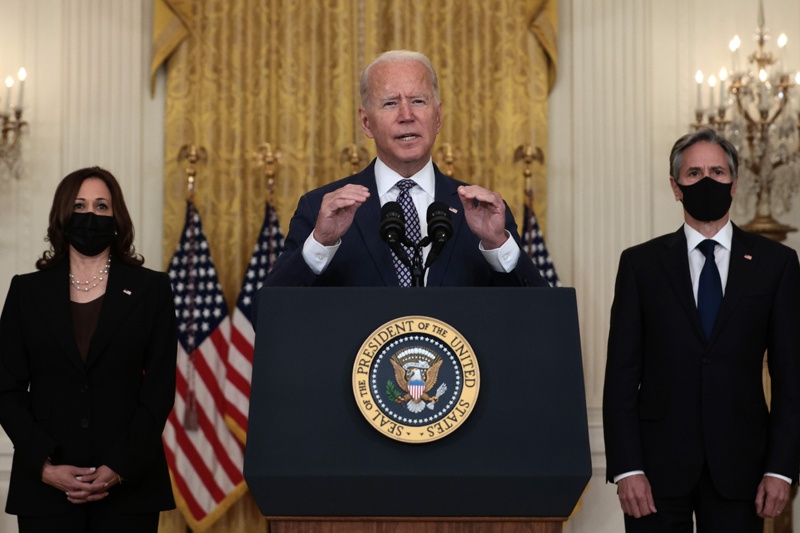 WASHINGTON, DC: US President Joe Biden delivers remarks on the US military's ongoing evacuation efforts in Afghanistan, while flanked by US Vice President Kamala Harris (left) and Secretary of State Antony Blinken (right), in the East Room of the White House on Friday.-AFP
WASHINGTON, DC: US President Joe Biden delivers remarks on the US military's ongoing evacuation efforts in Afghanistan, while flanked by US Vice President Kamala Harris (left) and Secretary of State Antony Blinken (right), in the East Room of the White House on Friday.-AFPWASHINGTON: President Joe Biden sought to reassure the United States on the dramatic evacuation from Afghanistan, promising no Americans would be abandoned in one of the "most difficult" airlifts in history. Widely criticized over the chaotic exit after a sudden Taleban victory, Biden warned that the frantic effort to fly Americans, other foreigners and Afghan allies out of Taleban-occupied Kabul was dangerous.
"This is one of the largest, most difficult airlifts in history," he said in a televised address from the White House. "I cannot promise what the final outcome will be." The White House says that about 13,000 people have got out on US military aircraft in less than a week, with the flow increasing. An hours-long pause was ordered Friday due to overcrowding at a base in Qatar, where planes were headed.
Biden cautioned that the US government does not know how many of its citizens are even in Afghanistan after 20 years of war. But he said firmly: "Let me be clear: any American who wants to come home, we will get you home." He also said the United States was "committed" to rescuing Afghans who had worked alongside US forces against the Taleban and who now fear retribution. Biden poured cold water on the idea of expanding the US military perimeter beyond Kabul's airport into Taleban-controlled streets, warning of "unintended consequences."
However, in one incident US troops did exit the airport to get 169 people inside to safety, the Pentagon said. On the world stage, Biden rejected the notion that the military debacle, in which the US-trained Afghan army imploded and allowed the Taleban to take over almost without a fight, was hurting Washington's credibility. "I have seen no question of credibility from our allies," Biden said.
Biden takes questions
The White House speech was only Biden's second on the crisis since the Taleban capture of Kabul last weekend. He also took questions from reporters after the address, the only time he has done so apart from an interview on ABC News. Critics were attacking Biden not just for being caught unaware by the rapidity of the Taleban takeover but his relatively low profile.
The White House, however, was clearly banking on a strategy of trying to separate the military-humanitarian crisis from the political arena. The Pentagon and State Department were in charge of giving detailed, daily press conferences, where the focus on logistical details helped polish the administration's tarnished claims to competency.
By contrast, Biden's usually omnipresent press secretary, Jen Psaki, has held only one briefing this week. Biden announced at the last minute Friday that he would not fly straight after his speech to his personal home in Delaware, as planned-although he was still heading there yesterday.
Domestic agenda in peril
It remained unclear what went wrong in the Biden administration's calculations in Afghanistan. However, the 78-year-old president appeared adamant that US voters will eventually forgive him for a terrifying and at times tragic few days in Kabul, instead remembering him as the president who ended 20 years of futile war.
White House Communications Director Kate Bedingfield on Friday echoed Biden's comments about the impossibility of avoiding a messy exit and said that, rather than being caught flat-footed, the administration had in fact "prepared for every contingency." There was "going to be a chaotic situation whether it happened five months ago, whether it happened five weeks ago or whether it happened this week," she told MSNBC.
The evacuation flights, secured by several thousand hastily deployed US troops, are not evidence of failure but of "foresight and planning," she said. But the drama has left Biden's political fortunes in a perilous position. Already his previously successful management of the COVID-19 pandemic was threatened by the Delta variant and ever fiercer politicization of mask and vaccine policies. And Biden's signature legislative success-getting trillions of dollars in infrastructure spending plans through a divided Senate-risks losing crucial momentum in the House at a time when his allies and advisors were consumed by the Afghan mess.
Polls showed that a large majority of Americans do not support war in Afghanistan, giving the White House confidence that eventually Biden will be able to say he was proven right. But this was the first week where the average approval ratings for Biden dipped below 50 percent. A Reuters/Ipsos poll found approval for Biden dropped from 53 to 46 percent over last weekend during the Taleban takeover of Kabul. - AFP









